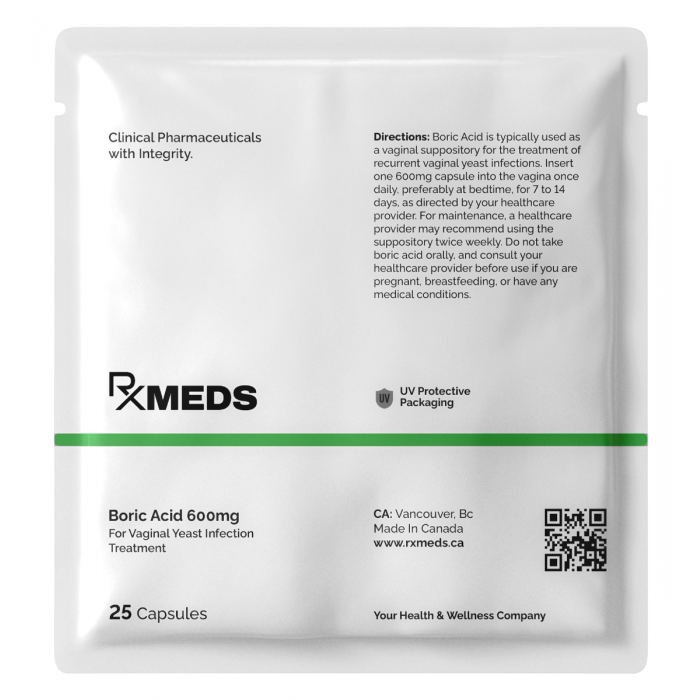Read More
What is Boric Acid?
Boric acid is a natural compound that comes in the form of a white crystalline powder. It is widely used for its antifungal, antibacterial, and insecticidal properties.
Commonly utilized in medicine, boric acid is prescribed to treat vaginal infections like bacterial vaginosis and yeast infections. It can also be used as an antiseptic for minor cuts and burns. In addition to its medical applications, boric acid is used as a pesticide, a preservative in some cosmetics, and a pH buffer in household and industrial products.
Generic name: boric acid
Other names: hydrogen borate, orthoboric acid
Drug classes: Antifungal agents, antiseptic agents
Warnings
Avoid ingesting boric acid. It is toxic if swallowed and can be harmful if inhaled in large quantities.
Keep boric acid away from children and pets, as it is hazardous in concentrated amounts.
Boric acid can cause skin or eye irritation. Always use protective gloves and avoid contact with mucous membranes unless prescribed by a healthcare provider.
Pregnant or breastfeeding individuals should consult a healthcare provider before using boric acid, especially for vaginal treatments.
Before Using This Product
Do not use boric acid if:
You are allergic to boric acid or any of its components.
You have open wounds in the area where boric acid is intended to be applied.
You are pregnant unless explicitly directed by a healthcare professional.
To ensure boric acid is safe for you, disclose any history of:
Reproductive health issues
Allergies to antifungal or antiseptic agents
Chronic skin conditions
Sensitivity to chemical substances
How Should I Use Boric Acid?
For medical applications, boric acid is typically used in suppository form for vaginal infections. Follow your healthcare provider’s instructions or product packaging directions closely.
Vaginal Suppositories: Insert one boric acid suppository into the vagina at bedtime, typically for 7-14 days.
Topical Use: Apply a thin layer of boric acid-based ointment to the affected area. Avoid overuse to prevent irritation.
Insecticidal Use: Sprinkle boric acid powder in areas where pests are present, such as cracks or crevices, ensuring it is kept out of reach of children and pets.
What Happens If I Miss a Dose?
For vaginal or topical treatments, apply or insert the missed dose as soon as you remember. If it is almost time for the next scheduled dose, skip the missed dose and resume your regular dosing schedule. Do not double the dose.
What Happens If I Overdose?
Overuse or ingestion of boric acid can lead to symptoms like nausea, vomiting, diarrhea, abdominal pain, or skin irritation. Seek emergency medical help or contact a poison control center immediately.
What to Avoid
Avoid using scented or perfumed products in combination with boric acid suppositories, as these may interfere with its efficacy or cause irritation.
Do not apply boric acid near the eyes or mucous membranes unless specifically instructed.
Avoid prolonged or excessive exposure to boric acid, particularly in poorly ventilated spaces.
Boric Acid Side Effects
Seek immediate medical attention if you experience an allergic reaction, including hives, swelling, or difficulty breathing.
Common side effects may include:
Mild vaginal irritation (with suppositories)
Burning or redness of the skin
Dryness or discomfort at the application site
What Other Products Will Interact with Boric Acid?
Boric acid may interact with certain medications or products, especially other antifungal agents or topical treatments. Inform your healthcare provider about any current treatments or prescriptions.
 |
|
